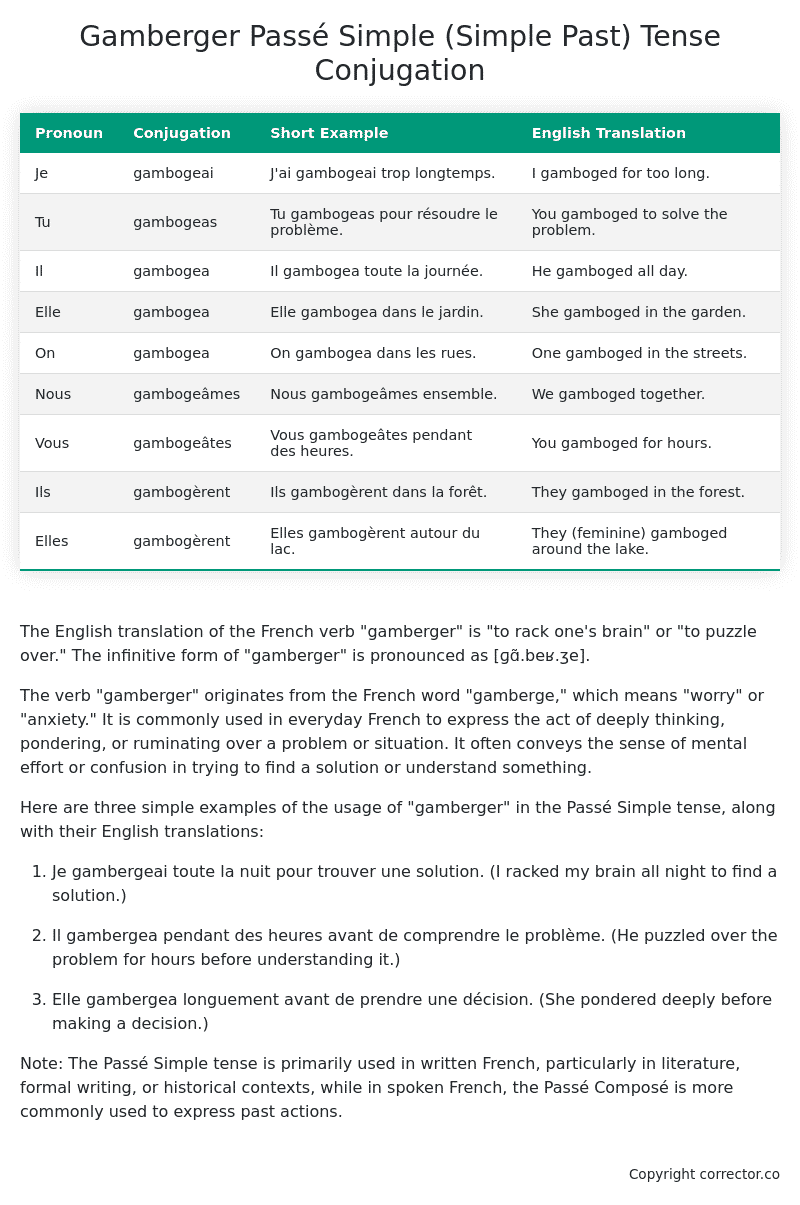Passé Simple (Simple Past) Tense Conjugation of the French Verb gamberger
Introduction to the verb gamberger
The English translation of the French verb “gamberger” is “to rack one’s brain” or “to puzzle over.” The infinitive form of “gamberger” is pronounced as [ɡɑ̃.beʁ.ʒe].
The verb “gamberger” originates from the French word “gamberge,” which means “worry” or “anxiety.” It is commonly used in everyday French to express the act of deeply thinking, pondering, or ruminating over a problem or situation. It often conveys the sense of mental effort or confusion in trying to find a solution or understand something.
Here are three simple examples of the usage of “gamberger” in the Passé Simple tense, along with their English translations:
-
Je gambergeai toute la nuit pour trouver une solution.
(I racked my brain all night to find a solution.) -
Il gambergea pendant des heures avant de comprendre le problème.
(He puzzled over the problem for hours before understanding it.) -
Elle gambergea longuement avant de prendre une décision.
(She pondered deeply before making a decision.)
Note: The Passé Simple tense is primarily used in written French, particularly in literature, formal writing, or historical contexts, while in spoken French, the Passé Composé is more commonly used to express past actions.
Table of the Passé Simple (Simple Past) Tense Conjugation of gamberger
| Pronoun | Conjugation | Short Example | English Translation |
|---|---|---|---|
| Je | gambogeai | J’ai gambogeai trop longtemps. | I gamboged for too long. |
| Tu | gambogeas | Tu gambogeas pour résoudre le problème. | You gamboged to solve the problem. |
| Il | gambogea | Il gambogea toute la journée. | He gamboged all day. |
| Elle | gambogea | Elle gambogea dans le jardin. | She gamboged in the garden. |
| On | gambogea | On gambogea dans les rues. | One gamboged in the streets. |
| Nous | gambogeâmes | Nous gambogeâmes ensemble. | We gamboged together. |
| Vous | gambogeâtes | Vous gambogeâtes pendant des heures. | You gamboged for hours. |
| Ils | gambogèrent | Ils gambogèrent dans la forêt. | They gamboged in the forest. |
| Elles | gambogèrent | Elles gambogèrent autour du lac. | They (feminine) gamboged around the lake. |
Other Conjugations for Gamberger.
Le Present (Present Tense) Conjugation of the French Verb gamberger
Imparfait (Imperfect) Tense Conjugation of the French Verb gamberger
Passé Simple (Simple Past) Tense Conjugation of the French Verb gamberger (You’re reading it right now!)
Passé Composé (Present Perfect) Tense Conjugation of the French Verb gamberger
Futur Simple (Simple Future) Tense Conjugation of the French Verb gamberger
Futur Proche (Near Future) Tense Conjugation of the French Verb gamberger
Plus-que-parfait (Pluperfect) Tense Conjugation of the French Verb gamberger
Passé Antérieur (Past Anterior) Tense Conjugation of the French Verb gamberger
Futur Antérieur (Future Anterior) Tense Conjugation of the French Verb gamberger
Subjonctif Présent (Subjunctive Present) Tense Conjugation of the French Verb gamberger
Subjonctif Passé (Subjunctive Past) Tense Conjugation of the French Verb gamberger
Subjonctif Imparfait (Subjunctive Imperfect) Tense Conjugation of the French Verb gamberger
Subjonctif Plus-que-parfait (Subjunctive Pluperfect) Tense Conjugation of the French Verb gamberger
Conditionnel Présent (Conditional Present) Tense Conjugation of the French Verb gamberger
Conditionnel Passé (Conditional Past) Tense Conjugation of the French Verb gamberger
Conditionnel Passé II (Conditional Past II) Tense Conjugation of the French Verb gamberger
L’impératif Présent (Imperative Present) Tense Conjugation of the French Verb gamberger
L’impératif Passé (Imperative Past) Tense Conjugation of the French Verb gamberger
L’infinitif Présent (Infinitive Present) Tense Conjugation of the French Verb gamberger
L’infinitif Passé (Infinitive Past) Tense Conjugation of the French Verb gamberger
Le Participe Présent (Present Participle) Tense Conjugation of the French Verb gamberger
Le Participe Passé (Past Participle) Tense Conjugation of the French Verb gamberger
Struggling with French verbs or the language in general? Why not use our free French Grammar Checker – no registration required!
Get a FREE Download Study Sheet of this Conjugation 🔥
Simply right click the image below, click “save image” and get your free reference for the gamberger Passé Simple tense conjugation!

Gamberger – About the French Passé Simple (Simple Past) Tense
Formation
Usage
Narration
Historical Context
Interactions with other tenses
Passé Composé
Imparfait
Conditional and Subjunctive
Summary
I hope you enjoyed this article on the verb gamberger. Still in a learning mood? Check out another TOTALLY random French verb conjugation!


